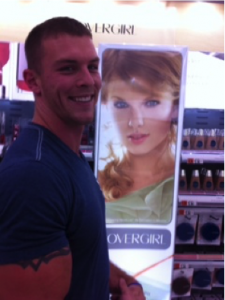By: Nicole Cocozza
Is music art? In a recent TIME article, Taylor Swift (“Swift), an American singer, answers in the affirmative. Swift states, “Music is art, and art is important and rare. Important, rare things are valuable.” Such opinion is what led Swift from pulling all her music from Spotify. Spotify is a popular music streaming site site know for having “music for everyone.” Spotify allows a user to browse or search for an artist, album, genre, playlist, or record label. Ironically, many artists like Swift disagree with the site and do not think “music is for everyone.”
Over the past decade, music has been easily accessible due to sites like Spotify. Such sites have not been popular with musicians worldwide due to the small per-stream royalty fee. On Spotify, musicians make less than one cent per a play. However, according to Spotify, singers like Swift making a “one-cent-per-stream royalty would likely rack in millions, compared to an unknown artist who makes around $425,000 a month in royalties.” Therefore, Swift’s current album, 1989, probably would have made millions in the first month. So, is Swift overreacting?
According to Spotify’s Artist Guidelines, the music on Spotify is fully licensed and prevents illegal or unlicensed music from being uploaded by third parties. In essence, Spotify is advocating for the artist, working on the same team protecting artists from people who like to partake in music piracy. Music piracy is the demon of music. It was the cause of the music industry decline. In 1999, Napster created the first free online file, which opened the market for music piracy. Then, the 2003 introduction of iTunes can be credited with the emergence of the idea of making people pay a small fee for the music. Spotify took a similar approach in 2006 playing the role of a moderator between the artist and user. It appears Spotify’s stance as a moderator had been successful until the recent controversy caused by Swift removing her music.
The Digital Millennium Copyright Act (“DMCA”) was enacted in 1998 to protect artists like Swift. One of the Act’s roles is to criminalize production and circumvention of music piracy that occurs on the Internet. However, Spotify asserts that providing a Copyright Policy is protecting its artists. Swift stated, “Piracy, file sharing and streaming have shrunk the numbers of paid album sales drastically, and every artist has handled this blow differently.” Yes Taylor, Spotify agrees with you that music piracy has drastically hurt the music industry, but it appears you are still successful. Spotify is only trying to help by acting as a moderator, by trying to satisfy both the artist and user.
Spotify is a two-fold entity. The artist gets to make their music known, while still making money. While it may not be very lucrative, it does help in the prevention of music piracy. So, maybe Swift should just “Shake It Off” and let the DMCA worry about music piracy.


You must be logged in to post a comment.